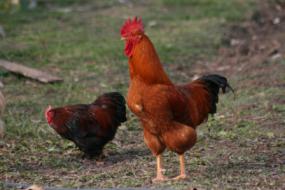Press Release
 The Department of Agriculture is advising the public that there is a temporary ban on the importation of live birds, particularly poultry including; chicken, duck, geese and or turkey, from specific jurisdictions in the United States and Toronto, Canada due to the spread of the Highly Pathogenic Avian Influenza (H5N2 Subtype).
The Department of Agriculture is advising the public that there is a temporary ban on the importation of live birds, particularly poultry including; chicken, duck, geese and or turkey, from specific jurisdictions in the United States and Toronto, Canada due to the spread of the Highly Pathogenic Avian Influenza (H5N2 Subtype).
Chief Agricultural Officer, Mr. Bevin Braithwaite said the temporary importation restriction is in accordance with the Animal (Disease and Importation) Act (CAP 88 Section 3(i)).
Mr. Braithwaite said that 17 states in the USA have confirmed cases of the influenza. These, he said, include Kansas, Iowa, Missouri, Minnesota, California, Idaho, Oregon, Washington, and British Columbia.
The Chief Agricultural Officer stated that the public’s awareness and cooperation is key to preventing an outbreak or spread of the virus into the Territory.
He said, “Any person with the intent to import live birds into the Territory must request an import permit from the Department of Agriculture, specifying the origin of the birds and the intended arrival before such a permit is granted.”
Chief Veterinary Officer with the Department of Agriculture, Dr. S. Michael Montrose said the Department, through the Veterinary Division, has been vigilant since the start of the outbreaks in November 2014 in Europe. He said poultry farmers were made aware of the outbreak and what should be done to avoid importing infected birds into the Territory.
Dr. Montrose said, “Now that the outbreaks have spread to the United States and North America, we have continued to notify farmers, importers and fowl handlers of the possible threat. We are carefully monitoring the situation and we hope that persons take the time to apply or call the department before importing birds from any area.”
Dr. Montrose added, “Although there may be measures in place for the ports of entry, we want persons to bare in mind that some of the wild infected poultry may be part of the migratory flocks that travel through our region via our flyways, therefore the department recognises this as an additional threat or pathway for introducing the highly pathogenic avian influenza virus into our Territory.”
The department has also introduced some educational programmes on Bird Flu awareness and prevention through local radio, and will continue to follow the status of the outbreak.
The Department of Agriculture is committed to maintaining good veterinary public health standards as it relates to the prevention of animal diseases that can cause major economic losses to the growing poultry industry in the Virgin Islands and threats to human health.

